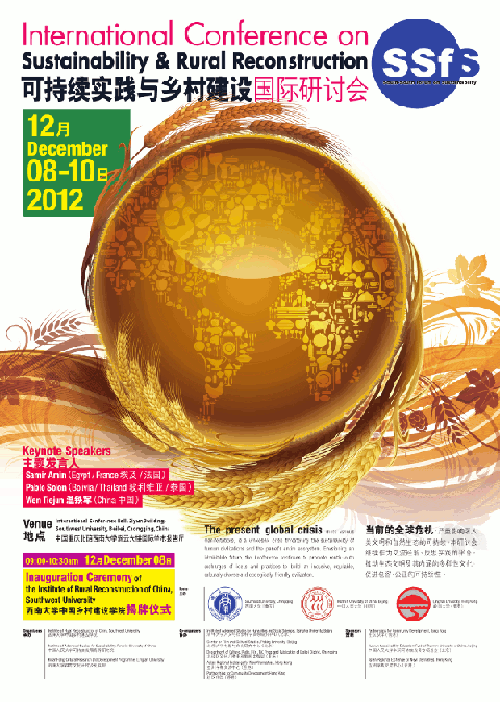Streaming Media
Additional Streaming Media
Event Title
2012 International Conference on Sustainability & Rural Reconstruction
Start Date
9-12-2012 11:45 AM
End Date
9-12-2012 1:00 PM
Language
English
Description
This paper is exploratory. It seeks to link the two dominant food systems of Chinawith impacts on human health, as measured by the increasing but differential incidence of non-communicable chronic diseases. China is passing through the Nutrition Transition where traditional diets are being replaced by high fat and meat diets, high calorie snacks and meals with high protein and oil intakes.The argument is constructed on the basis that in general urban citizens increasingly consume processed foods manufactured by the industrial food system. Rural people on the other hand remain consuming their traditional diets. Process foods derive from industrial agriculture while local food is derived in a self provisioning way from small mixed farms growing grains and vegetables and keeping farmyard livestock; the so-called, ‘one family; two systems’ way of peasant farming.
The statistics from the China Yearbook, the North Carolina Nutrition study, 1993 to 2009 and the China Sanitation survey provide preliminary evidence to support this supposition at the macro scale. An associative link can be made that shows that food from the small mixed farm village environments is generally healthier than the fast food, processed diets of urban dwellers. This simplistic conclusion must be tempered by the effects of other life style behaviors that can also affect the health status of Chinese citizens, whether rural or urban. However, overall, there is evidence that suggests that as Chinese society becomes wealthier and more urbanized, the health status of citizens as measured by food related chronic diseases, becomes poorer. In terms of the incidence of chronic diseases, rural citizens are less at risk than urban citizens and this in large part is influenced by their food intake patterns which in turn reflect the two systems of food production (local and industrial) that prevail inChina. The paper concludes with some reflections on what this paradox means for food system research in emerging economies such asChina.
本文为探讨性,旨在把食物系统连系到对人类健康的影响。这影响可用非传染性长期病患发生率的不同程度的增加来作量度。中国正在通过“营养过渡”阶段,传统的饮食正被高脂肪及高肉类饮食、高热量零食、以至高蛋白质餐及多油餐所代替。文章的立论基础在于,普遍来说城市人曰渐多吃经过食物工业系统加工的食物, 而农村人则仍保持着传统饮食习惯。加工食物,由工业化的农业所生产; 而农村本土食物, 则通过小型农场种植谷物蔬菜以及饲养牲畜, 即所谓 “—家两制” 的农村种植方式而自给自足。
从中国年报、北卡罗连立洲1993—2009的研究、以及中国卫生调查所得的数字, 可以为以上的假设提供宏观程度上的初步证据。另—可以作出的相关连系, 显示农村环境中的小型混合式农场所生产的食物, —般比城市人进食的快餐及加工食物健康。这—简单化的结论, 当然需要加上其他因素,例如中国人民不论城乡的其他生活方式及行为, 对他们的康状况的影响。但总体来看, 有证据显示中国社会逐渐富裕及城市化的同时, 中国人民的健康状况正逐渐转差。这可以用食物相关的长期病患发生率来量度。从长期病患的发生率来说, 乡间人民的危险较城市居民为低, 而个中原因大部份来自他们不同的进食模式的影响, 这也反映出中国主流的两种食物生产系统(本土及工业化)。本文结语反思了这矛盾,对在中国这样的发展中经济所做的食物系统研究有何启示。
Document Type
Conference
Presentation Material
Anthony M. Fuller, Theresa Schumilas & Si Zhenzhong-abstract-chi.docx (16 kB)
加拿大与中国社区支持农业的对比研究
Anthony M. Fuller, Theresa Schumilas & Si Zhenzhong-abstract-eng.docx (16 kB)
CSAs in Canada and China - Innovation and Paradox
Recommended Citation
Fuller, A. M. (2012, December). Linking food systems and human health: Geographic variations in China. Paper presented at 2012 International Conference on Sustainability & Rural Reconstruction, Southwest University, Chongqingng, China.
Included in
Demography, Population, and Ecology Commons, Growth and Development Commons, Other International and Area Studies Commons, Place and Environment Commons, Sociology of Culture Commons
Linking food systems and human health : geographic variations in China = 链接食物系统与人类健康:中国城乡之间的差别
This paper is exploratory. It seeks to link the two dominant food systems of Chinawith impacts on human health, as measured by the increasing but differential incidence of non-communicable chronic diseases. China is passing through the Nutrition Transition where traditional diets are being replaced by high fat and meat diets, high calorie snacks and meals with high protein and oil intakes.The argument is constructed on the basis that in general urban citizens increasingly consume processed foods manufactured by the industrial food system. Rural people on the other hand remain consuming their traditional diets. Process foods derive from industrial agriculture while local food is derived in a self provisioning way from small mixed farms growing grains and vegetables and keeping farmyard livestock; the so-called, ‘one family; two systems’ way of peasant farming.
The statistics from the China Yearbook, the North Carolina Nutrition study, 1993 to 2009 and the China Sanitation survey provide preliminary evidence to support this supposition at the macro scale. An associative link can be made that shows that food from the small mixed farm village environments is generally healthier than the fast food, processed diets of urban dwellers. This simplistic conclusion must be tempered by the effects of other life style behaviors that can also affect the health status of Chinese citizens, whether rural or urban. However, overall, there is evidence that suggests that as Chinese society becomes wealthier and more urbanized, the health status of citizens as measured by food related chronic diseases, becomes poorer. In terms of the incidence of chronic diseases, rural citizens are less at risk than urban citizens and this in large part is influenced by their food intake patterns which in turn reflect the two systems of food production (local and industrial) that prevail inChina. The paper concludes with some reflections on what this paradox means for food system research in emerging economies such asChina.
本文为探讨性,旨在把食物系统连系到对人类健康的影响。这影响可用非传染性长期病患发生率的不同程度的增加来作量度。中国正在通过“营养过渡”阶段,传统的饮食正被高脂肪及高肉类饮食、高热量零食、以至高蛋白质餐及多油餐所代替。文章的立论基础在于,普遍来说城市人曰渐多吃经过食物工业系统加工的食物, 而农村人则仍保持着传统饮食习惯。加工食物,由工业化的农业所生产; 而农村本土食物, 则通过小型农场种植谷物蔬菜以及饲养牲畜, 即所谓 “—家两制” 的农村种植方式而自给自足。
从中国年报、北卡罗连立洲1993—2009的研究、以及中国卫生调查所得的数字, 可以为以上的假设提供宏观程度上的初步证据。另—可以作出的相关连系, 显示农村环境中的小型混合式农场所生产的食物, —般比城市人进食的快餐及加工食物健康。这—简单化的结论, 当然需要加上其他因素,例如中国人民不论城乡的其他生活方式及行为, 对他们的康状况的影响。但总体来看, 有证据显示中国社会逐渐富裕及城市化的同时, 中国人民的健康状况正逐渐转差。这可以用食物相关的长期病患发生率来量度。从长期病患的发生率来说, 乡间人民的危险较城市居民为低, 而个中原因大部份来自他们不同的进食模式的影响, 这也反映出中国主流的两种食物生产系统(本土及工业化)。本文结语反思了这矛盾,对在中国这样的发展中经济所做的食物系统研究有何启示。

